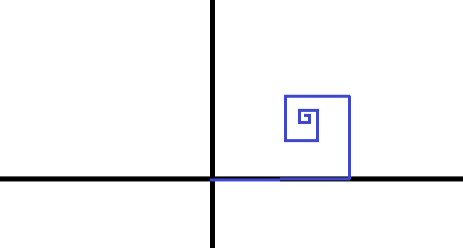Brilli the bug
 Brilli the Bug
has set out on a journey of infinite steps starting at the origin of the
x
y
-plane. It moves in the following manner:
Brilli the Bug
has set out on a journey of infinite steps starting at the origin of the
x
y
-plane. It moves in the following manner:
- After each, n th step, it turns 9 0 ∘ counter-clockwise
- Each n th step is of length D n where D n is given by D n = ( n + 1 ) 2 2 for n ≥ 0 .
If the final displacement of brilli from the starting is given by α 1 β G γ + π η , find α + β + γ + η .
Notation: G denotes the Catalan's constant .
The answer is 2334.
This section requires Javascript.
You are seeing this because something didn't load right. We suggest you, (a) try
refreshing the page, (b) enabling javascript if it is disabled on your browser and,
finally, (c)
loading the
non-javascript version of this page
. We're sorry about the hassle.
2 solutions
Consider the complex number z = x + i y , then ∣ z ∣ is the displacement of Brilli from the origin. We note that z 0 = ( 0 + 1 ) 2 1 = 1 2 2 , z 1 = 1 2 2 + 2 2 2 i , z 2 = 1 2 2 + 2 2 2 i + 3 2 2 i 2 and so on, implying:
z ∞ = 1 2 2 + 2 2 2 i + 3 2 2 i 2 + 4 2 2 i 3 + 5 2 2 i 4 + 6 2 2 i 5 + ⋯ = i 2 ( 1 2 i + 2 2 i 2 + 3 2 i 3 + 4 2 i 4 + 5 2 i 5 + 6 2 i 6 + ⋯ ) = i 2 ( 1 2 i − 2 2 1 − 3 2 i + 4 2 1 + 5 2 i − 6 2 1 − ⋯ ) = 2 ( 1 2 1 + 2 2 i − 3 2 1 − 4 2 i + 5 2 1 + 6 2 i + ⋯ ) = 2 ( 1 2 1 − 3 2 1 + 5 2 1 − ⋯ ) + 2 i ( 2 2 1 − 4 2 1 + 6 2 1 + ⋯ ) = 2 G + 2 2 2 i ( 1 2 1 − 2 2 1 + 3 2 1 + ⋯ ) = 2 G + 2 i ( 1 2 1 + 2 2 1 + 3 2 1 + ⋯ − 2 ( 2 2 1 + 4 2 1 + 6 2 1 + ⋯ ) ) = 2 G + 2 i ( 1 2 1 + 2 2 1 + 3 2 1 + ⋯ − 2 2 2 ( 1 2 1 + 2 2 1 + 3 2 1 + ⋯ ) ) = 2 G + 4 i ( 1 2 1 + 2 2 1 + 3 2 1 + ⋯ ) = 2 G + 4 i ⋅ ζ ( 2 ) = 2 G + 4 i ⋅ 6 π 2 = 2 G + i 2 4 π 2 where G is the Catalan’s constant. where ζ ( ⋅ ) is the Riemann zeta function.
⟹ ∣ z ∞ ∣ = 4 G 2 + 2 4 2 π 4 = 2 4 1 4 ⋅ 2 4 2 G 2 + π 4
⟹ α + β + γ + δ = 2 4 + 4 ⋅ 2 4 2 + 2 + 4 = 2 3 3 4
References:
Let x denote the horizontal coordinate and y the vertical coordinate. Without loss of generality, we can assume that the first step is north (in the y -direction), then left (in the x -direction), then south, fourth right, and so on ad infinitum. In this case, the final x -displacement is x-displacement = n = 0 ∑ ∞ ( 2 n + 1 ) 2 2 ( − 1 ) n = 2 n = 0 ∑ ∞ ( 2 n + 1 ) 2 ( − 1 ) n = 2 G whereas the final y -displacement is y-displacement = n = 0 ∑ ∞ ( 2 n + 2 ) 2 2 ( − 1 ) n = 2 1 n = 0 ∑ ∞ ( n + 1 ) 2 ( − 1 ) n = 2 1 ( 1 2 π 2 ) = 2 4 π 2 So the final displacement after infinite steps is ( x-displacement ) 2 + ( y-displacement ) 2 = ( 2 G ) 2 + ( 2 4 π 2 ) 2 = 2 4 1 2 3 0 4 G 2 + π 4 where α = 2 4 , β = 2 3 0 4 , γ = 2 , δ = 6 . Thus, α + β + γ + δ = 2 3 3 4